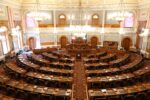This week, we explore diverse perspectives on open access. We hear from researchers and authors and consider the role that patients play in open science. We also look at the importance of data management in open science and at the debate surrounding regulation in academic publishing.
To read:
Fair open access data via Unlock | 8-minute read
Many research groups, including those that are beneficiaries of NWO or EU Horizon 2020 funding, are required to provide access to and facilitate the reuse and preservation of the research data generated as part ofheir work. For this, data management plans need to be developed. This three-part blog series from Unlock discusses ways in which researchers can ensure their experimental data is findable, accessible, interoperable and reusable (FAIR), and introduces the FAIR Data Platform.
Do academic publishers need more regulation? via björn.brembs.blog | 12-minute read
The author of this blog post discusses the breakdown of publishers’ publication and non-publication costs – that is, the money they spend on publishing articles and the money they spend on other things, such as maintaining paywalls and marketing. More than half of the revenue that publishers receive from scholarly articles may be spent in the ‘non-publication costs’ category. The author raises the argument that scholarly journal publishing may not be a market but rather a collection of small monopolies, and advocates greater regulation and the development of genuine market alternatives.
Highlights from the Research Data Alliance Plenary via The Scholarly Kitchen | 8-minute read
In this blog post, Phill Jones, co-founder of MoreBrains Consulting Cooperative, shares his experience with the Research Data Alliance (RDA), a community-driven, non-profit initiative that supports open sharing and reuse of data. Phill talks about the most recent RDA plenary from November 2021 and summarizes the key themes, which ranged from strategic discussions to the research data ecosystem and to the more niche aspects of metadata and data schema for particular disciplines.
To listen to:
Experience with open access via Player.FM | 35-minute podcast
In this podcast from PhD Talk, the hosts explore open science and open access publishing, share how their attitudes towards open access have changed over time, and discuss what they would still like to learn and implement. They also talk about the role of universities and funding agencies in the open access movement.
Open access and books via YouTube | 60-minute video
In this webinar, organized by Electronic Information for Libraries, Professor Martin Paul Eve (Birkbeck College, University of London) and Dr Frances Pinter (Executive Chair, Central European University Press), discuss their ongoing work to convert the Central European University Press to an open access model. In particular, they talk about issues of infrastructure, funding, language and participation. They also touch on how the publishing model they are developing is designed to ensure a more inclusive approach to book publishing in the future.
To engage with:
Patient Engagement Open Forum 2021 via Patient Focused Medicines Development
The Patient Engagement Open Forum will be held virtually this year, from 7 to 9 December 2021. The forum, which will feature a series of online sessions and webinars, focuses on working with patients to create solutions for patients facilitating collaboration and co-creation of solutions for patients and with patients. More patient engagement forums will be organized by Patient Focused Medicines Development every quarter of the year.
An introductory series of workshops on open science via 4EU+ Alliance
Several universities within the EU have united under the 4EU+ Alliance to run a series of introductory workshops on open science. They have already run one session on what open science is and one on the cycle of scientific publications; both presentations are available here. Over the next 6 months, there will be more than 10 sessions on a broad range of topics, including funder open access requirements, strategies for publishing in open access journals, fair and open research data management and citizen science. Information on all the workshop sessions and links to register for each can be found in the link above.
Have you read our recommendations for plain language summaries of peer-reviewed medical journal publications? Find out more here and join the discussion on social media using the hashtag #PlainLanguageSummaries!






